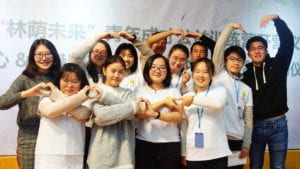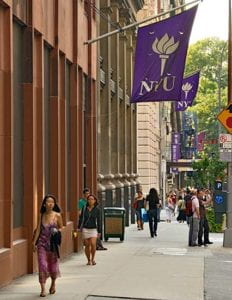 Have a wonderful summer and we look forward to bringing you more stories from across NYU’s global network in the coming months and especially once we are all back to school!
Have a wonderful summer and we look forward to bringing you more stories from across NYU’s global network in the coming months and especially once we are all back to school!
NYU Wordpress Theme
Month: May 2019
Congratulations Graduates!
In Conversation with NYU Shanghai Senior Yang Xiaohan
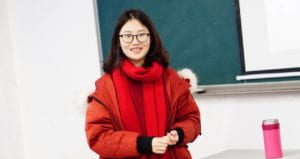 When she looks back on her time at NYU Shanghai, Yang Xiaohan ’19 says her four years here have been dominated by two themes: Her community service and efforts to expand opportunities for poor children in China, and her work toward a double major in Finance and Data Science.
When she looks back on her time at NYU Shanghai, Yang Xiaohan ’19 says her four years here have been dominated by two themes: Her community service and efforts to expand opportunities for poor children in China, and her work toward a double major in Finance and Data Science.
Yang is a native of Chengdu, in Sichuan Province. During her sophomore year, Yang co-founded the NGO FutureChina with some high school classmates to connect teenagers from economically disadvantaged families in southwest China with educational resources.
“We run a training camp where we invite 50-70 high school students from poor areas of Sichuan Province to workshops run by college students who have a proven record of academic excellence,” explains Yang. “We cover topics like business, computer science, and economics.”
As the group leader for students interested in business, Yang shows them how to create a business plan one step at a time, and encourages them to put their ideas to paper in a creative, yet methodical fashion. Most of the students end up writing business plans with ideas about how to give back to society and serve others, says Yang. “That really touched me. Many of them want to do something about the environment. They want to build companies in garbage sorting and reuse and they need some help developing the ideas and sorting out the impracticalities.”
Yang has been engaged in social impact activities at NYU Shanghai since her first year. At first, she joined the Stepping Stones Videolink initiative to give remote English lessons to fourth graders in Sichuan and Henan every week. Later, she joined the Deans Service Scholars, a university initiative to provide students opportunities to serve and study in disadvantaged communities in Shanghai and Asia, on a trip to Yunnan, planting trees and building a new habitat for the black snub-nosed monkey. While there, she noticed that most of the men and women in the area had left the region to find work, while only the old and young remained in the villages. The children had no parents to look after them, and had to walk for hours to school.
Realizing the inequalities in education resources in Henan and Yunnan spurred Yang’s efforts with FutureChina.
Jiang Ying, the group leader for the DSS trip to Yunnan, recalls meeting Yang for the first time during the interview for DSS. “She spoke very simply, but one thing she said left a deep impression on me,” remembers Jiang. “She said she’d heard about DSS at NYU Shanghai in high school, and that’s why she came here. She seemed anxious throughout the interview, but when she told me about this, there was a light in her eyes.”
Anna Kendrick, Clinical Assistant Professor & Director of Global Awards, taught Yang in a Global Perspectives on Society section during her first semester at NYU Shanghai. Kendrick has witnessed her growth over the past four years. “I admire her positivity and deep sense of justice,” says Kendrick. “[She has a] thoughtfulness about how she can best leverage her skills to create change.”
Yang says she also has ambitions beyond China – and wants to bring the voices of China’s poorest children to the world stage. During the winter of her junior year, Yang attended the Youth Assembly at the United Nations to talk to youth leaders from around the world about the unequal distribution of educational resources. After listening to her speech, an UN official said to her that he wished that the children themselves could come share their experiences.
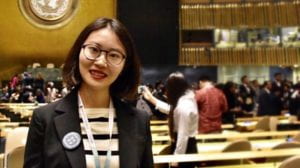
During the winter of her junior year, Yang Xiaohan attended the Youth Assembly at the United Nations.
That official’s comment inspired Yang’s latest venture. Future China now also selects high school students from its training camps, and sends them to the UN’s Youth Assemblies. “Since the summer of 2018, we’ve sent five students to the UN assembly. It really impacted them, seeing so many peers on such a huge platform, actively promoting global issues,” says Yang. “These UN trips have gradually helped them transition from people who need help, to people who want to help others. Yes, abilities and resources are still limited, but the seed of wanting to help others has been planted.”
Yang says her drive to help others developed very early in her life. When Yang was in primary school, one of her grandmothers lived in a part of Sichuan that was stricken by a severe earthquake. The volunteers who poured into the area to help left a lasting impression. “So many strangers helped them, selflessly. I also saw volunteers pitching in on disaster relief efforts,” remembers Yang. “That was when I decided I had to become like them.”
Though her interest in volunteering was set from the very beginning of her college career, Yang’s academic interests only became clear after a long process of soul-searching.
“When I started here, I wasn’t sure what I actually liked. I started taking finance classes because my family wanted me to try it,” Yang says. However, after interning at financial companies during the summers after her second and third years, Yang couldn’t see herself in the finance sector. In the meantime, Yang had discovered a new academic interest. After taking the IMA course, Interaction Lab, to meet the science requirement of the core curriculum, Yang discovered a passion for data and coding.
“Though it seems like I stumbled into data science, I think it was actually inevitable,” Yang says. “I was fascinated by the coding aspect. It was just so cool to realize an idea through code!”
While she was studying away in New York during her third year, Yang took the Introduction to Programming and Data Science course at NYU Stern. “It was a heavy course-load,” says Yang. “It was full-stack programming. We learned how to use web crawlers, construct databases, analyze data, and design websites.”
Yang says that the systematic nature of the course nurtured a love of data mining and analysis, and affirmed her decision to choose data science as a second major.
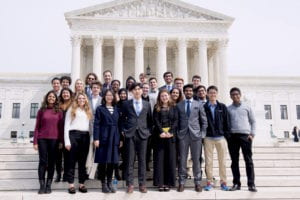
During study-away in New York, Yang Xiaohan also took the University Honors Leadership Course. In this class, the professor brought students to DC to visit the Supreme Court and interact with judges.
After returning to NYU Shanghai for her final year of university, Yang worked on a research project in her Machine Learning course under the direction of Enric Junqué de Fortuny, which uses linear regression, gradient descent, and neural networks. Yang and her team’s project involves concert pricing and venue selection, and is aimed at helping independent music groups set competitive ticket prices, and find the best venues.
Yang has learned to apply her data science know-how to other disciplines. She is assisting Assistant Professor Faculty Fellow of Engineering, Chen Zhibin in his work on transportation planning and new energy vehicles.
After graduation, Yang will return to Chengdu, and join a research project by the Institution of New Economic Development. “At this think tank, I will be doing research with Professor Zhou Tao, who is quite influential in China’s big data sector,” says Yang. “One of their ongoing projects is using information from CVs to analyze gender equality.”
Yang says her interest in this research topic is the real motivator behind her decision to return home. She recalls reading texts on topics of gender in her Global Perspectives on Society course during freshman year, and says this course introduced her to foundational feminist theories.
“Returning to Chengdu also means I’ll be on the ground for many of FutureChina’s efforts. We need people in Chengdu right now,” Yang says.
Kendrick says she is impressed with Yang’s determination to bring both the hard skills and ethical foundations she has built in school to her goals for social work. “She is not afraid to take risks and devote herself to her organization,” say Kendrick. “I wish her strength, courage and renewed dedication to her social efforts!”
Yang says she will miss the open and inclusive environment at NYU Shanghai. “This school is always encouraging everyone to think about who they really want to be. This gave me the courage to do what I’m truly interested in,” says Yang. “If I had gone somewhere else, perhaps I would still be adrift and unsure, afraid to make my own decisions.”
This post comes to us from NYU Shanghai. You can find the original here.
Mariet Westermann Named Vice Chancellor of NYU Abu Dhabi
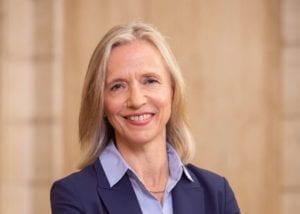 NYU President Andrew Hamilton today announced the appointment of Mariet Westermann — Executive Vice President of The Andrew W. Mellon Foundation, former provost of NYU Abu Dhabi, former director of NYU’s Institute of Fine Arts, and art historian — as the Vice Chancellor of NYU Abu Dhabi, effective August 1, 2019.
NYU President Andrew Hamilton today announced the appointment of Mariet Westermann — Executive Vice President of The Andrew W. Mellon Foundation, former provost of NYU Abu Dhabi, former director of NYU’s Institute of Fine Arts, and art historian — as the Vice Chancellor of NYU Abu Dhabi, effective August 1, 2019.
Her selection follows a 10-month long, international search that considered many outstanding candidates from around the world. According to President Hamilton, “We are thrilled by the appointment of Mariet Westermann. The creation of NYU Abu Dhabi was an innovative move, one that has helped make NYU pre-eminent in global education. And thanks to our shared vision with our partners, NYU Abu Dhabi has been a tremendous success: with distinguished faculty, top students from around the world from all backgrounds, and excellent leadership, it has become a regional leader in research, and its graduates have gone on to prestigious international honors, top graduate and professional programs, and leading employers and positions. Therefore, in choosing a new Vice Chancellor, we sought someone who would not only be a leader capable of taking NYU Abu Dhabi into its next stage, but who would also contribute to NYU’s leadership globally and be a real presence in the cultural and intellectual life of Abu Dhabi.”
“With her proven leadership qualities, her experience and involvement in the founding of NYUAD, her superb academic qualifications, her skill as an institution-builder, in Mariet Westermann we found just such a person,” said President Hamilton.
Dr. Westermann, the Vice Chancellor-designate of NYU Abu Dhabi, said, “It is a great honor and calling to serve as NYU Abu Dhabi’s Vice Chancellor. In a brief nine years, NYU Abu Dhabi has become a unique, flourishing institution of higher education: in and of New York University, in and of Abu Dhabi, in and of the world, with a truly diverse and engaged student community, an outstanding and dedicated faculty, an innovative undergraduate curriculum, and an ambitious research agenda. At a time when international engagement is vital to the future of our planet, NYU Abu Dhabi is a beacon situated in a dynamic city and a historic crossroads.”
In addition to being named to the Vice Chancellorship, she will be appointed a Professor of Arts and Humanities at NYU Abu Dhabi.
Westermann has been at the Mellon Foundation since 2010, and has been the executive vice president for programs and research since 2016. In that role, she has launched initiatives that study and promote the value of the humanities and the liberal arts, strengthen community colleges, encourage graduate education reform, renew preservation of cultural heritage around the world, and support scholars and artists at risk. At Mellon, she has also led pathbreaking work on diversity and inclusion in American museums, and written extensively about the liberal arts, the humanities, and higher education. Prior to the foundation, she was on the faculty at NYU, first as director of the Institute of Fine Arts and then as the first provost of NYU Abu Dhabi, where she hired the startup team and initial faculty, helped shape the curriculum and launch the NYU Abu Dhabi Institute, and developed warm relationships with the Abu Dhabi community, among other important undertakings. Before coming to NYU in 2002, she was associate director of the Clark Art Institute. From 1995 to 2001, she was an assistant and associate professor of art history at Rutgers.
She received her undergraduate degree, magna cum laude, from Williams College, where she was elected to Phi Beta Kappa. She received her Masters and her PhD from NYU’s Institute of Fine Arts.
Westermann’s principal area of scholarly interest is the art of the Netherlands, her native country. She is widely published in the field, including A Worldly Art: The Dutch Republic 1585–1718 (1996); The Amusements of Jan Steen: Comic Painting in the 17th Century (1997); Rembrandt – Art and Ideas (2000); and numerous articles. She has edited five books, including Anthropologies of Art (2005). Her extensive work with museums includes her Rijksmuseum Dossier: Johannes Vermeer (2004); the curatorship of Art and Home: Dutch Interiors in the Age of Rembrandt (Denver Art Museum and Newark Museum, 2001); and numerous exhibition catalog essays. She is currently preparing an exhibition and book on the resonance of the Garden of Eden in the history, theology, and art of Judaism, Christianity, and Islam, with significant implications for garden practice in these cultures. She has been the recipient of fellowships, honors, and grants from a wide range of organizations, including the National Endowment for the Humanities, American Philosophical Society, Center for Advanced Study in the Visual Arts, Clark Art Institute, College Art Association, and Metropolitan Museum of Art.
President Hamilton said, “Along with the announcement of this good news about Mariet, two expressions of gratitude in order. First, I am grateful to Dick Foley and Una Chaudhuri, the co-chairs of the Search Committee, and all the other members of the Committee. Their thoughtfulness, discernment, and perseverance have resulted in a wonderful person to lead NYU Abu Dhabi during the next stage of its development. The Committee members took on this important task in addition to their existing responsibilities, and I thank them.
“I would also like to take this occasion to extend NYU’s profound gratitude to Al Bloom, NYU Abu Dhabi’s inaugural vice chancellor. Turning a groundbreaking idea into a reality is one of the most exciting things one can do in one’s career, and one of the most difficult, perhaps particularly so in the field of higher education, where reputation matters so greatly and usually requires such a long time to build. Al made sure that NYU Abu Dhabi succeeded on every measure. Over time, the establishment of NYU Abu Dhabi will, without doubt, turn out to be one of the great success stories of higher education. Al should be very proud of what he’s accomplished; we are surely proud of him.”
NYU Abu Dhabi represents a transformative shift in higher education, one in which the intellectual and creative endeavors of academia are shaped and examined through an international and multicultural perspective. Admissions selectivity and yield among students from over 120 countries equals or exceeds that of the most rigorous global institutions. And in under ten years, NYU Abu Dhabi has produced 12 Rhodes Scholars — the highest number of Rhodes Scholars per student of any university in the world – in addition to five Schwarzman Scholars and numerous other prestigious academic awards, including Truman and Luce Scholarships and Fulbright Awards.
This post comes to us from NYU Abu Dhabi. You can find the original here.
NYU Paris Liberal Studies Freshman Students Win Prize at NYU Policy Case Competition
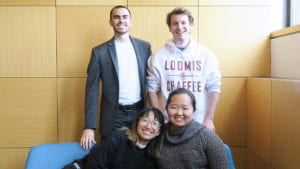 NYU Paris Liberal Studies freshman or First Year Away students Spencer Julian, Jarrett Lash, Wendy Li, and Cecilia Wang competed in the sixth annual New York University Policy Case Competition this weekend, where the team won the international policy category and competed in the Final Five round.
NYU Paris Liberal Studies freshman or First Year Away students Spencer Julian, Jarrett Lash, Wendy Li, and Cecilia Wang competed in the sixth annual New York University Policy Case Competition this weekend, where the team won the international policy category and competed in the Final Five round.
The Policy Case Competition is a conference hosted by the NYU Politics Society, in which students of all experience levels are given the opportunity to propose policy solutions in response to critical current issues. This year’s first round competition had over 550 participants from universities around the world, with the competition divided into five topics: International, Domestic, New York City, Technology, and South Africa.
Julian, Lash, Li, and Wang submitted a policy memo on maritime policy, with recommendations to the Executive Office of the United States to strengthen its capabilities in the arctic region by increasing military soft power and facilitating the creation of an intergovernmental forum on arctic trade and economics.
This post comes to us thanks to NYU Paris and Liberal Studies and you can learn more here.
NYU Berlin Hosts Seminar – Feminist Urbanism: Designing Cities that Work for Women
 On 7 May NYU Berlin hosted a seminar entitled Feminist Urbanism: Designing Cities that Work for Women. The seminar featured Professor Sylvia Maier of the NYU Center for Global Affairs and an NYU Berlin GRI Fellow.
On 7 May NYU Berlin hosted a seminar entitled Feminist Urbanism: Designing Cities that Work for Women. The seminar featured Professor Sylvia Maier of the NYU Center for Global Affairs and an NYU Berlin GRI Fellow.
Questions considered included: What would a city designed by women look like? How would its public transportation network, commuter hubs, sidewalks, parks, and shape of buildings be different from the Berlin, New York, Dubai, or Bariloche of today? Focussing on Berlin and Vienna, which both introduced a gender lens into urban design, Professor Maier will discuss how feminist planners and urbanists are working to “un-gender” and (re-)democratize urban public spaces
Learning from Locals – A Student Perspective on a Czech Homestay Experience
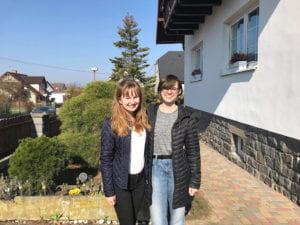 A Remedy for Homesickness: A Weekend Homestay in Hlinsko
A Remedy for Homesickness: A Weekend Homestay in Hlinsko
By Zoey Schilling
Studying abroad has been an amazing and intensely rewarding experience so far, but I’ve definitely started to miss some parts of home: the charm of a low-key rural town, driving around on deserted backroads and, most of all, enjoying delicious home-cooked meals. Dinner doesn’t quite have that same warm and fuzzy feeling when I spend two hours trying to make a recipe that said it would only take half an hour, especially when it still doesn’t even taste that great. Thankfully, going on the Hlinsko homestays cultural immersion trip gave me the chance to recapture some of these familiar phenomena that I had started to miss from home.
The trip began on a Friday morning at 7:30 a.m., when a group of 12 students, myself included, left Prague in a bus and headed off for Hlinsko, which is about a two-and-a-half hour drive away. Honestly, I had passed out for most of the drive, but when I woke up we were approaching a high school in Hlinsko at around 10:30 a.m. We entered the faculty lounge of the school to find about a dozen Czech students, aged 15 to 18, sitting around two tables. We went through a quick round of introductions and spent about half an hour chatting with them and enjoying the desserts and snacks they had made. It was a bit overwhelming at first, but in a good way! I ended up sitting next to a girl named Lucie, and we hit it off really well from the start.
After we all mingled for a little bit, the Czech students took us on a tour of their school in small groups. The school was old-fashioned and the students seemed bored out of their minds. (Clearly some things are culturally universal.) I’m not going to lie, it kind of gave me hives to walk around a high school again, especially because we would interrupt classes and end up staring at the students as we observed their classes, and they naturally returned the awkward favor. I felt like both an animal and a visitor at a zoo.
Next on the agenda was lunch at a local Czech restaurant, where we found out that we would get to pick who we stayed with that night. Lucie and I agreed that I’d stay with her, which was a huge relief for me. I had found my homestay host without hassle!
After the pairings-up and lunch, we all went to a ceramics workshop in a house in a very rural part of the town. The woman who owned the house was a professional artist who had designed many things in her home, including the countertop in her kitchen and the tiling of her bathroom. My ceramics creation was an attempt at a crescent-ish plate, so maybe it’s not quite as impressive as her work, but I guess it’s the thought that counts, right?
 Following our wholesome and peaceful experience at the ceramics house, Lucie and her friends took me and another NYU student to a restaurant-slash-tourist attraction called Peklo Čertovina, which literally translates to “Čertovina Hell.” (Čertovina is an area not far from the center of Hlinsko.) How welcoming. Despite the ominous name and décor, the place seemed pretty cute and fun — I would have loved to explore if we had had more time to hang out there (apparently the building has seven floors underground!).
Following our wholesome and peaceful experience at the ceramics house, Lucie and her friends took me and another NYU student to a restaurant-slash-tourist attraction called Peklo Čertovina, which literally translates to “Čertovina Hell.” (Čertovina is an area not far from the center of Hlinsko.) How welcoming. Despite the ominous name and décor, the place seemed pretty cute and fun — I would have loved to explore if we had had more time to hang out there (apparently the building has seven floors underground!).
After visiting Peklo Čertovina, Lucie took me back to her house in a nearby town called Skuteč. She gave me a walking tour of the small town of about 3,000 people, which was a nice change of scenery from the comparatively bustling center of Prague. Her mother had prepared a traditional Czech goulash meal for dinner. Neither of Lucie’s parents spoke English, and I’m still barely getting by with what I learned in the Introduction to Czech crash course we took during orientation week. I’m pretty sure I just kept repeating said “dobrý” and “děkuji,” smiling and hoping I was making a good impression as I waited for Lucie to translate my gratitude. At the end of my stay, they kept insisting that I come back and visit whenever I’m back in the Czech Republic, so I think they liked me.
On the following day, after having the biggest breakfast I’ve had since coming to Prague, I had to say goodbye to Lucie and her family. Though I had just met them less than 24 hours ago, I was sad to leave them. Lucie and I have kept in contact in the short time since the trip, and I’m excited to send her the most ridiculous postcards I can find once I get back to New York City.
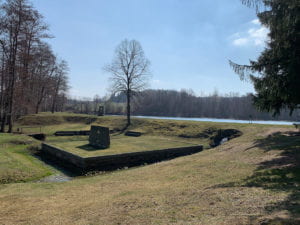 Once everyone said goodbye to their host families, we all visited the memorial site at Ležáky, a village that was destroyed under Nazi occupation of Czechoslovakia in World War II. The village was never rebuilt, making the memorial site an especially moving and important place to experience. It was a tragic and strangely serene site, a humbling way to end our cultural immersion trip with the Hlinsko students.
Once everyone said goodbye to their host families, we all visited the memorial site at Ležáky, a village that was destroyed under Nazi occupation of Czechoslovakia in World War II. The village was never rebuilt, making the memorial site an especially moving and important place to experience. It was a tragic and strangely serene site, a humbling way to end our cultural immersion trip with the Hlinsko students.
I would highly recommend the homestays trip to any NYU student interested in really throwing themselves into Czech culture, even if it is just for one night. If nothing else, it’s a great way to meet new people and feel like you’re back at home for a moment when a wave of homesickness washes over you in the middle of the semester.
This post originally appeared on NYU Prague Now and can be found here. All photo credits Zoey Schilling.
NYU Stern’s New Executive MBA program in Washington, DC – In Conversation with Student Michael Woody
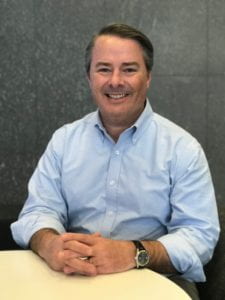 Today we are in conversation with Michael Woody, who is a member of inaugural class of the new NYU Stern EMBA program at NYU Washington, DC. Michael provides federal advocacy, policy development, and public affairs services to biopharmaceutical, medical device, and other health care companies. Over the course of his career, he has developed and managed large-scale advocacy plans for major trade associations as well as brand-specific legislative strategies for companies within the biotechnology sector. He has policy expertise in pharmaceutical and medical device issues, including FDA user fee programs, drug development, Medicare and Medicaid, the 340B program, and biodefense.
Today we are in conversation with Michael Woody, who is a member of inaugural class of the new NYU Stern EMBA program at NYU Washington, DC. Michael provides federal advocacy, policy development, and public affairs services to biopharmaceutical, medical device, and other health care companies. Over the course of his career, he has developed and managed large-scale advocacy plans for major trade associations as well as brand-specific legislative strategies for companies within the biotechnology sector. He has policy expertise in pharmaceutical and medical device issues, including FDA user fee programs, drug development, Medicare and Medicaid, the 340B program, and biodefense.
1. You already have an established and successful career. When did you start to consider that an MBA might be a useful credential and what do you hope to gain?
I considered an MBA at least since my first round of graduate school in the late 1990s, but I was focused more on building a career in Washington. About nine years ago, I started a small policy and advocacy consulting firm that focuses on pharmaceuticals and medical devices with three partners. Our clients include both large-pharma and small bio-techs. My basic dilemma was that I understood the political and policy context of our clients’ issues, but I really didn’t understand their businesses – how do they really operate? How do they define risk? Am I providing them with useful advice? Am I asking them the right questions? I think this problem is endemic in government affairs – we don’t understand business and business doesn’t understand us. I thought an MBA would be useful to try and solve this problem.
2. How did you hear about the Stern Executive MBA program in Washington, DC and what about the program did you find appealing? Why did you elect to enroll in this program?
I read NYU Stern was extending their Executive MBA Program to DC, and I knew it by reputation. I enjoyed the people I met through the process and decided to take the plunge. One of the biggest factors for me was the schedule – one weekend a month. While that weekend is very intense – it’s a lot – and the work in between doesn’t really ever stop, it was manageable with a job and a family with young children. I have three weekends with them, and one spent on school every month. I can work around their schedule much better than other program formats. I think my kindergarten-age son gets a kick out of me being in school, too. To him, we are both learning to count.
3. Do you have any priorities for or personal goals that you would like to realize during the program?
I wanted to enhance my quantitative skills and take risks with classes that would have scared me off as an undergraduate or as a graduate student in a different stage of life. There is no real penalty for trying something hard you may not be good at. I like that idea at this point in life. Beyond understanding my clients’ businesses better, I know I have an entrepreneurial bend, and this experience may push me in a different direction entirely which would be interesting, too.
4. How has the experience been thus far? Can you describe what you have found in terms of your fellow students, the professors, the courses?
I have been energized by the class weekends, which is a little bit of a surprise. It is so different from my day-to-day job that it’s almost a mental break to think about a completely different set of issues and problems. Stern did a good job building our class. Everyone has a different set of professional and personal experiences. If you have a question about a business, a market or an academic topic, someone, somewhere in the class knows something about it. In my study group alone, we have a museum executive, someone who works for the World Bank, an engineer who owns a robotics company, and an IT professional. There are former military officers, a physician, a movie producer, someone who worked for the NBA, finance people, etc. Many of our classmates have advanced degrees already and most have well over a decade of experience. For that reason the discussions in and out of class can be even more important than class itself.
I have enjoyed the professors – all of them have been great teachers with no exceptions. Our ethics professor, Bruce Buchanan, may have been the best teacher I have ever had – bar none. He used economics, law, politics and philosophy to create a framework to think through ethical problems. His last class was a tour de force performance and it left a mark.
5. Has anything been quite different from what you expected? What have you found most surprising, rewarding, or challenging?
Yes. I’m better at certain things than I thought I would be. The opposite is probably also true. I knew the core courses would be a challenge, but I enjoyed some things I didn’t expect – like accounting, which we had at the beginning of the program. I spent two weeks on and off trying to figure out one single problem. I didn’t get it right, but I learned a ton in the process. I’m never going to be an accountant, but that’s not the point. The point is to gain familiarity and fluency in the language and application of business concepts.
In Firms and Markets, we did a big project on Trader Joe’s, which I loved. I’m never going to be in the grocery business, but I know a lot about what it takes to run a grocery chain, and there are things I learned that are broadly applicable to companies I work with everyday.
The Global Study Tour course is a big highlight. We went to Shanghai. It’s hard to describe the scale of it without seeing it in person. The companies we toured all had something to say about China’s past, present and future. We will all be influenced by China over the course of our careers, whether we realize it or not. Most of us already have been.
6. Do you see any particular advantages to pursuing an executive MBA in Washington, DC?
Washington, DC is a big and growing market that has less and less to do with government with each passing day, and our class reflects that. While we have a few people with past government or NGO experience, the vast majority of people do other things. In other words, there is more variation of experience than you would expect.
7. Would you recommend the program to prospective executive MBA students? If so, why? What about the Stern program in DC do you find especially compelling?
I would recommend Stern’s Executive MBA Program to prospective students. I’ve been happy with the content, the workload and my classmates. As a new program, Stern is trying to make an impression here, and it’s only going to get better over time. One point I would make to anyone considering it – the professors and the administration know you have jobs and a life. They are trying to teach you what you need to know, but the work is reasonable and relevant. You won’t be able to do everything well 100% of the time. They know that. But if you put in the time, you will get a lot out of it.
8. Have you already found the coursework relevant to your work or do you have a sense of how the degree will be helpful to you in the future?
Absolutely. There is almost never a class weekend that I don’t come back with a concept I can apply. I think my partners got tired of me drawing schematics on the whiteboard. Like anything, what you learn and apply is up to you. The material is there, you have to do the work and apply it for yourself.
Studying Great World Texts with High School Students in Buenos Aires
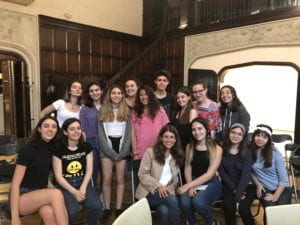 Today we are in conversation with Jazmin Jinnah, who shares her experiences with Gallatin’s Great World Texts course in Buenos Aires. For six years, NYU Buenos Aires has been sending NYU students to local high schools via
Today we are in conversation with Jazmin Jinnah, who shares her experiences with Gallatin’s Great World Texts course in Buenos Aires. For six years, NYU Buenos Aires has been sending NYU students to local high schools via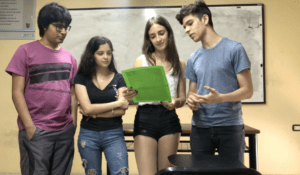 3. I understand that the course focuses on diversity, equity, and inclusion in the literary canon and involves working with local high schools. NYU students serve as tutors in the Argentine classrooms and each work closely with a group of students to creatively engage with texts from multicultural authors. How was this experience? What was most surprising? Rewarding?
3. I understand that the course focuses on diversity, equity, and inclusion in the literary canon and involves working with local high schools. NYU students serve as tutors in the Argentine classrooms and each work closely with a group of students to creatively engage with texts from multicultural authors. How was this experience? What was most surprising? Rewarding?
